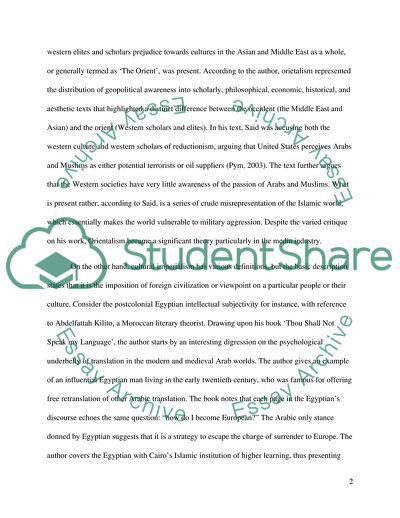Cite this document
(Influence of Orientalism and Cultural Imperialism on Cultural Translation Report Example | Topics and Well Written Essays - 3000 words, n.d.)
Influence of Orientalism and Cultural Imperialism on Cultural Translation Report Example | Topics and Well Written Essays - 3000 words. https://studentshare.org/culture/1774547-critically-assess-the-influence-of-orientalism-and-cultural-imperialism-on-cultural-translation-your-answer-should-make-reference-to-a-specific-example-of-translation-between-cultures-as-part-of-contemporary-globalization
Influence of Orientalism and Cultural Imperialism on Cultural Translation Report Example | Topics and Well Written Essays - 3000 words. https://studentshare.org/culture/1774547-critically-assess-the-influence-of-orientalism-and-cultural-imperialism-on-cultural-translation-your-answer-should-make-reference-to-a-specific-example-of-translation-between-cultures-as-part-of-contemporary-globalization
(Influence of Orientalism and Cultural Imperialism on Cultural Translation Report Example | Topics and Well Written Essays - 3000 Words)
Influence of Orientalism and Cultural Imperialism on Cultural Translation Report Example | Topics and Well Written Essays - 3000 Words. https://studentshare.org/culture/1774547-critically-assess-the-influence-of-orientalism-and-cultural-imperialism-on-cultural-translation-your-answer-should-make-reference-to-a-specific-example-of-translation-between-cultures-as-part-of-contemporary-globalization.
Influence of Orientalism and Cultural Imperialism on Cultural Translation Report Example | Topics and Well Written Essays - 3000 Words. https://studentshare.org/culture/1774547-critically-assess-the-influence-of-orientalism-and-cultural-imperialism-on-cultural-translation-your-answer-should-make-reference-to-a-specific-example-of-translation-between-cultures-as-part-of-contemporary-globalization.
“Influence of Orientalism and Cultural Imperialism on Cultural Translation Report Example | Topics and Well Written Essays - 3000 Words”. https://studentshare.org/culture/1774547-critically-assess-the-influence-of-orientalism-and-cultural-imperialism-on-cultural-translation-your-answer-should-make-reference-to-a-specific-example-of-translation-between-cultures-as-part-of-contemporary-globalization.


